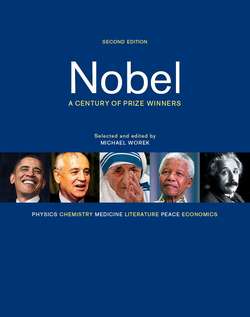Читать книгу Nobel - Michael Worek - Страница 15
На сайте Литреса книга снята с продажи.
ОглавлениеHenri Becquerel (1852–1908)
1903 Physics
In recognition of the extraordinary services he has rendered by his discovery of spontaneous radioactivity.
Antoine Henri Becquerel was one of the most renowned physicists at the end of the 19th century, and his work is still widely recognized today. He grew up in a world where physics was a popular subject of conversation and a part of everyday life. His interest in physics began with his grandfather, Antoine César, and his father, Alexander Edmond Becquerel, was a scientist and professor of applied physics. Aware of the enormous work he would have to do to become a respected physicist, Henri Becquerel began his career at the Paris Polytechnic in 1872. He also distinguished himself at the École Nationale des Ponts-et-Chaussées (National School of Bridges and Roads), where he became an engineer and later received his doctorate. Along with these achievements he advanced his professional career by teaching at both the Department of Natural History at the Paris Museum and the Paris Polytechnic.
An extremely hardworking man, Becquerel dedicated himself to physics, dividing his days betweens the demands of teaching, studying and scientific research. He did, however, marry twice, first to the daughter of a civil engineer. Their son became a physicist, ushering in a fourth generation of scientists into the Becquerel family. This marriage ended after four years with the death of his wife, and he remarried a decade later, in 1890.
Among the daily bustle, Becquerel continued his research, strengthening his family’s reputation and maintaining his own high profile. In 1896 he demonstrated the phenomenon that would overshadow his previous work. His discovery of spontaneous radioactivity brought him the 1903 Nobel Prize in Physics, which he shared with Marie and Pierre Curie, who extended his research into the phenomena. Showing that not all atomic nuclei are stable has proven to be one of the greatest scientific revolutions of our age.
Becquerel published many papers about his discoveries, mainly in the Annales de physique et chimie (Annals of Physics and Chemistry) and the Comptes rendus de l’Academie des Sciences (Proceedings of the French Academy of Sciences). Called the “father of radioactivity,” he was elected a member of the French Academy of Sciences, where he remained a prominent figure. Further important posts he held during his life include those in the Accademia dei Lincei and the Royal Academy of Berlin. After a life marked by achievement, Becquerel died in Le Croisic.
Pierre and Marie Curie also each received one-quarter of the prize.
